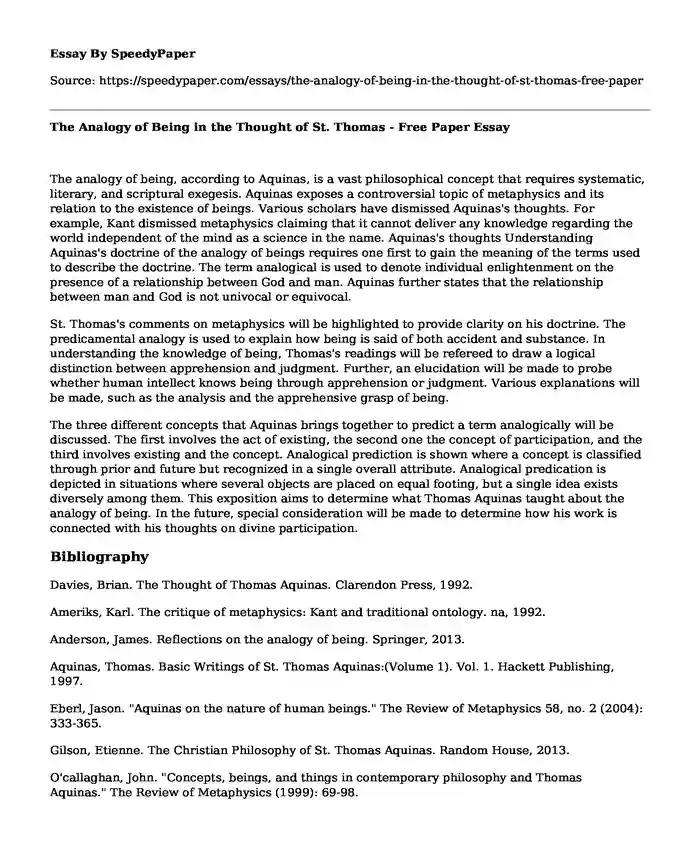
| Type of paper: | Essay |
| Categories: | Philosophy God |
| Pages: | 2 |
| Wordcount: | 521 words |
The analogy of being, according to Aquinas, is a vast philosophical concept that requires systematic, literary, and scriptural exegesis. Aquinas exposes a controversial topic of metaphysics and its relation to the existence of beings. Various scholars have dismissed Aquinas's thoughts. For example, Kant dismissed metaphysics claiming that it cannot deliver any knowledge regarding the world independent of the mind as a science in the name. Aquinas's thoughts Understanding Aquinas's doctrine of the analogy of beings requires one first to gain the meaning of the terms used to describe the doctrine. The term analogical is used to denote individual enlightenment on the presence of a relationship between God and man. Aquinas further states that the relationship between man and God is not univocal or equivocal.
St. Thomas's comments on metaphysics will be highlighted to provide clarity on his doctrine. The predicamental analogy is used to explain how being is said of both accident and substance. In understanding the knowledge of being, Thomas's readings will be refereed to draw a logical distinction between apprehension and judgment. Further, an elucidation will be made to probe whether human intellect knows being through apprehension or judgment. Various explanations will be made, such as the analysis and the apprehensive grasp of being.
The three different concepts that Aquinas brings together to predict a term analogically will be discussed. The first involves the act of existing, the second one the concept of participation, and the third involves existing and the concept. Analogical prediction is shown where a concept is classified through prior and future but recognized in a single overall attribute. Analogical predication is depicted in situations where several objects are placed on equal footing, but a single idea exists diversely among them. This exposition aims to determine what Thomas Aquinas taught about the analogy of being. In the future, special consideration will be made to determine how his work is connected with his thoughts on divine participation.
Bibliography
Davies, Brian. The Thought of Thomas Aquinas. Clarendon Press, 1992.
Ameriks, Karl. The critique of metaphysics: Kant and traditional ontology. na, 1992.
Anderson, James. Reflections on the analogy of being. Springer, 2013.
Aquinas, Thomas. Basic Writings of St. Thomas Aquinas:(Volume 1). Vol. 1. Hackett Publishing, 1997.
Eberl, Jason. "Aquinas on the nature of human beings." The Review of Metaphysics 58, no. 2 (2004): 333-365.
Gilson, Etienne. The Christian Philosophy of St. Thomas Aquinas. Random House, 2013.
O'callaghan, John. "Concepts, beings, and things in contemporary philosophy and Thomas Aquinas." The Review of Metaphysics (1999): 69-98.
Owens, Joseph. "Analogy as a Thomistic Approach to Being." Mediaeval Studies 24 (1962): 303-322.
Te Velde, Rudi A. Participation and substantiality in Thomas Aquinas. Brill, 1995.
White, Thomas Joseph. Wisdom in the face of modernity: A study in Thomistic natural theology. Sapientia Press of Ave Maria University, 2016.
W Norris Clarke, S. J. The one and the many: A contemporary thomistic metaphysics. University of Notre Dame Pess, 2015.
Wippel, John F. Metaphysical Themes in Thomas Aquinas II. Vol. 2. CUA Press, 2007.
Wippel, John F., and Rev Msgr John F. Wippel. The metaphysical thought of Thomas Aquinas: From finite being to uncreated being. Vol. 1. CUA Press, 2000.
Cite this page
The Analogy of Being in the Thought of St. Thomas - Free Paper. (2024, Jan 08). Retrieved from https://speedypaper.com/essays/the-analogy-of-being-in-the-thought-of-st-thomas-free-paper
Request Removal
If you are the original author of this essay and no longer wish to have it published on the SpeedyPaper website, please click below to request its removal:
- Free Essay in Religion: Character Sketch for Gospel of Mathew
- Book Review Essay Sample: Dharma in Hell
- The Glory of God - Free Essay Sample in Religion
- Free Essay Sample: Religion in Narrative of the Life of Fredrick Douglas
- Journey Through Hell. Free Essay Example
- Defending Literature Against the Slanders of Plato. Paper Example
- The Hero's Journey Unveiled: A Personal Odyssey Through Departure, Initiation, and Reward - Essay Sample
Popular categories




